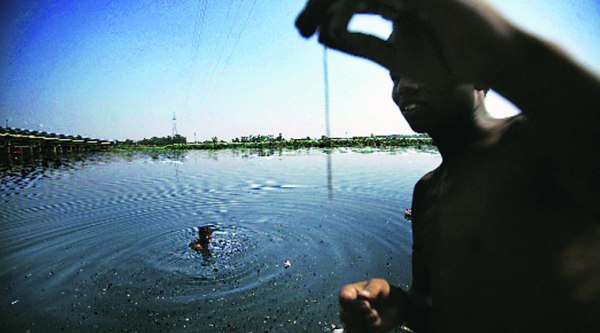Black river, buried treasure: How river Yamuna provides livelihood to people
To those who brave the dark waters of the Yamuna, the river rewards them with a livelihood.
 Hidden Beneath: Nikhil shows a chain he’s found in Yamuna river. (Source: Praveen Khanna)
Hidden Beneath: Nikhil shows a chain he’s found in Yamuna river. (Source: Praveen Khanna)
Every morning at 8, Renu sees off her husband Sonu to work. Esconced in her one-room house in Narela, Renu thinks that Sonu works at the Delhi Boat Club at India Gate. She has been there only once since she got married and came to live in the capital; that was four months ago. But Sonu travels a few more kilometres to reach his real workplace — the Yamuna. At the banks of the river near ITO in central Delhi, the 26-year-old strips to his underwear, stashes his clothes at a makeshift temple nearby, and goes down the steps leading to the bank and wades into the river.
An expert swimmer and diver, Sonu spends the entire day in search of coins and other valuables that devotees throw into the river. “In a single day, we collect Rs 200-500. On some days, we even find gold rings and chains,” says Sonu. Suddenly, he seems to have found something. It’s just a keychain. But he’s not worried, this time of the year is usually profitable for them. Ganesh Chaturthi and the Navratras have just gone by and Diwali and Chhath are round the corner. “During festivals, people even drop silver coins and gold jewellery in the Yamuna. But we get stuff round the year, too,” says Sonu, who claims to come to the river even during winter. When it gets very cold, he takes up a short assignment with the Delhi Boat Club.
The river is not very crowded today. “The Muslims haven’t come today because it’s Jumma,” says Sonu, pointing to the small mazaar adjacent to the temple. A teenager, Nikhil, swims back to the shore after depositing some puja material mid-stream. He has been lucky today and flashes a wide smile, fishing out a silver ring and a chain from his red cotton loincloth. The 17-year-old is new to the river, where black is the predominant colour. He used to work for a dhaba at ITO till a few months ago and started visiting the river when he lost the job. “I will do this until I get another job,” he says.
Sonu knows the river like the back of his hand. “I used to live with my parents in the nearby jhuggis that were demolished in the early 2000s. As children, we used to look for money to buy snacks and toys,” he says. His bare shoulders glisten in the sunlight; the rest of his body is submerged in the murky water of the Yamuna. “The water has no ill-effects on us because we have got used to it. We respect it for it gives us food and shelter,” he says.
A few feet away, near a broken boat moored to the bank, another man is feeling the riverbed with his hands. “I’ve been coming here since 1993, but my children are in respectable professions,” he says. Refusing to divulge his name or anything else, he swims away from the bank, strewn with broken pots, waste and small heaps of filth. For some, even this is a holy dip. Another swimmer, Arvind, 24, says, “Nobody can get infections or diseases here. In fact, this water can heal.”



- 01
- 02
- 03
- 04
- 05
























